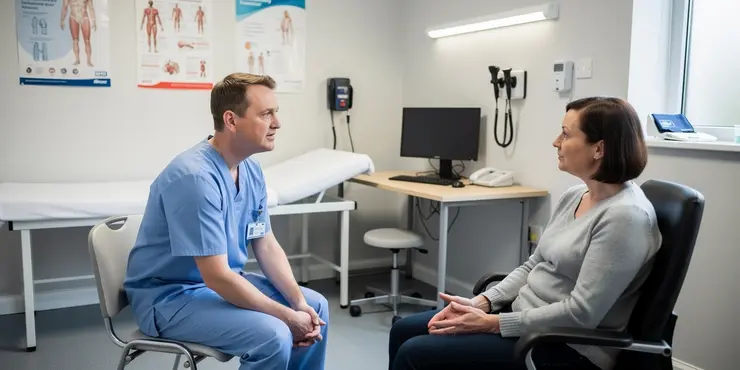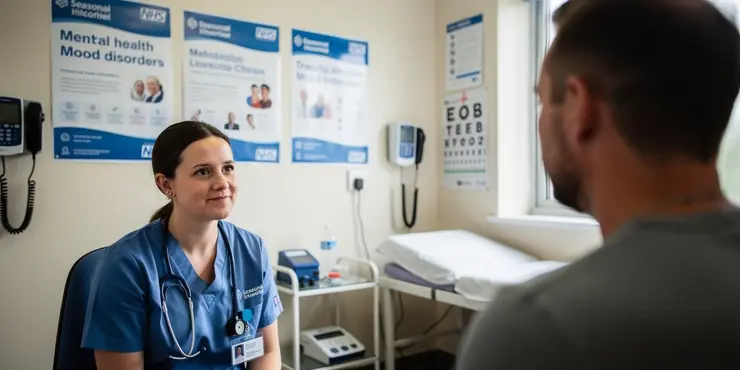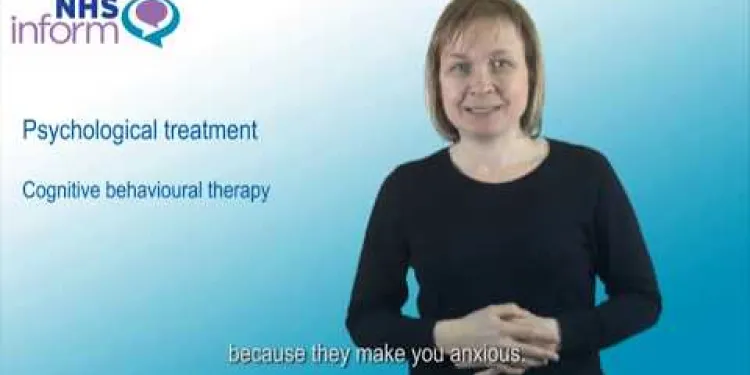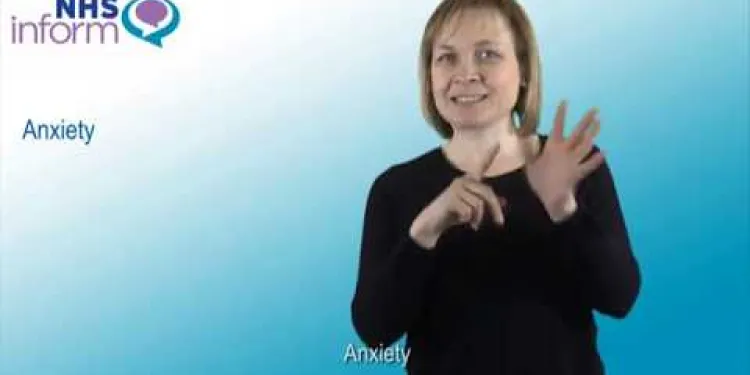Find Help
More Items From Ergsy search
-

BSL - Diagnosis of panic disorder
Relevance: 100%
-

BSL - Introduction to panic disorder
Relevance: 76%
-

BSL - Causes of panic disorder
Relevance: 73%
-

BSL - Symptoms of panic disorder
Relevance: 72%
-

BSL - Treatment of panic disorder
Relevance: 72%
-

BSL - Panic disorder: things you can do to help yourself
Relevance: 62%
-

BSL - Diagnosis of obsessive compulsive disorder (OCD)
Relevance: 46%
-

BSL - How to deal with panic attacks
Relevance: 46%
-

Attention deficit hyperactivity disorder (ADHD) - Diagnosis
Relevance: 44%
-
How are eating disorders diagnosed?
Relevance: 37%
-

How do eating disorders affect mental health?
Relevance: 31%
-
What is an eating disorder?
Relevance: 30%
-

Bipolar disorder: Rod's story | NHS
Relevance: 29%
-
What is an Eating Disorder?
Relevance: 29%
-

Eating disorders: treatment
Relevance: 29%
-

Living with Bipolar Disorder
Relevance: 28%
-
Is it possible to recover from an eating disorder?
Relevance: 28%
-

Prostate cancer diagnosis and tests
Relevance: 27%
-
Are there preventative measures for eating disorders?
Relevance: 27%
-

The treatment approach for an eating disorder
Relevance: 27%
-
Can eating disorders be treated?
Relevance: 27%
-

Head and Neck Cancer Diagnosis
Relevance: 27%
-
What are the early warning signs of an eating disorder?
Relevance: 27%
-

What is Seasonal Affective Disorder? (SAD)
Relevance: 27%
-
Who is at risk for developing an eating disorder?
Relevance: 26%
-
Are eating disorders only about food?
Relevance: 26%
-
What are the main types of eating disorders?
Relevance: 26%
-
Can eating disorders occur with other mental health conditions?
Relevance: 26%
-
What are some common myths about eating disorders?
Relevance: 26%
-
What are common symptoms of eating disorders?
Relevance: 26%
-

Are AI systems used alone in lung cancer diagnosis or alongside human radiologists?
Relevance: 26%
-

How common is Seasonal Affective Disorder?
Relevance: 26%
-

Short Films About Mental Health - Personality Disorders
Relevance: 26%
-
How can someone seek help for an eating disorder?
Relevance: 25%
-

Attention deficit hyperactivity disorder (ADHD) - Introduction
Relevance: 25%
-
What is body dysmorphia and how is it related to eating disorders?
Relevance: 25%
-

Developmental Coordination Disorder (DCD) for Children and Young People
Relevance: 25%
-

What is the impact of eating disorders on physical health?
Relevance: 25%
-

Treating generalised anxiety disorder (GAD)
Relevance: 25%
-

Generalised anxiety disorder (GAD)
Relevance: 25%
Diagnosis of Panic Disorder
Introduction to Panic Disorder
Panic Disorder is a mental health condition characterised by recurrent and unexpected panic attacks. These panic attacks involve a sudden onset of intense fear or discomfort, accompanied by physical and cognitive symptoms such as palpitations, sweating, trembling, shortness of breath, chest pain, dizziness, and a fear of losing control or dying. Understanding the diagnosis of panic disorder is essential for effective treatment and management.
Recognising the Symptoms
In the United Kingdom, mental health professionals use criteria outlined in the Diagnostic and Statistical Manual of Mental Disorders (DSM-5) to diagnose Panic Disorder. To be diagnosed, individuals must experience recurrent, unexpected panic attacks and persistent concern or worry about having additional attacks or their consequences. Symptoms should persist for at least one month and not be attributable to substances, medical conditions, or other mental health disorders.
Initial Assessment
The diagnosis typically begins with a comprehensive evaluation by a General Practitioner (GP). This may involve a detailed medical history and physical examination to rule out other medical conditions that could mimic the symptoms of panic attacks. If necessary, the GP may refer the patient to a mental health specialist, such as a psychiatrist or psychologist, for further diagnostic assessment.
Psychological Evaluation
A psychological evaluation involves a series of interviews, questionnaires, and self-report assessments designed to gather information about the individual's symptoms, mental health history, and the impact of panic attacks on their daily life. Tools often used include the Panic Disorder Severity Scale (PDSS) and the Generalised Anxiety Disorder 7 (GAD-7) scale, which help quantify the severity and frequency of symptoms.
Exclusion of Other Conditions
Part of the diagnostic process involves the exclusion of other mental health disorders that may present with similar symptoms, such as Generalised Anxiety Disorder (GAD), social anxiety disorder, and specific phobias. Additionally, medical conditions like hyperthyroidism, cardiac arrhythmias, and vestibular disorders must be ruled out as potential causes of the symptoms.
Diagnosis and Treatment Plan
Once a diagnosis of Panic Disorder is confirmed, a tailored treatment plan is developed. This may include Cognitive Behavioural Therapy (CBT), medication such as selective serotonin reuptake inhibitors (SSRIs) or benzodiazepines, and lifestyle modifications. Early diagnosis and intervention are key in managing symptoms and improving the quality of life for individuals living with Panic Disorder in the UK.
Understanding the Diagnosis of Panic Disorder
What is Panic Disorder?
Panic disorder is a type of anxiety disorder characterized by sudden and repeated episodes of intense fear accompanied by physical symptoms such as a racing heart, dizziness, and shortness of breath. These episodes, known as panic attacks, can occur unexpectedly and can significantly affect a person's ability to function in daily life.
Symptoms of Panic Disorder
Panic disorder is diagnosed when a person experiences recurrent panic attacks and persistently worries about having more attacks. Physical symptoms include chest pain, trembling, sweating, and feelings of losing control or impending doom. It's important to rule out other medical conditions that may cause similar symptoms, such as heart disease or thyroid problems.
Diagnosing Panic Disorder in the UK
In the United Kingdom, the diagnosis of panic disorder typically involves a comprehensive evaluation by a GP or a mental health specialist such as a psychiatrist. The process starts with a detailed discussion of the patient's symptoms, medical history, and any triggering events. Diagnostic criteria from the ICD-10 or DSM-5 may be used, which require the presence of recurrent, unexpected panic attacks, and ongoing concern about additional attacks.
Assessment Tools and Techniques
Healthcare providers may use standardized assessment tools to evaluate the severity and impact of panic disorder symptoms. Questionnaires and interview guides are often used to gather information. Physical examinations and laboratory tests might be conducted to rule out other conditions. Mental health professionals in the UK are trained to provide a sensitive and confidential environment for assessment.
Treatment and Management
Once diagnosed, panic disorder is treatable through various interventions including cognitive behavioural therapy (CBT), which is commonly recommended in the UK. Medication such as selective serotonin reuptake inhibitors (SSRIs) may also be prescribed. Early diagnosis and intervention can significantly improve the quality of life for individuals experiencing panic disorder.
Diagnosis of Panic Disorder
What is Panic Disorder?
Panic Disorder is a health problem that affects the mind. People with Panic Disorder have sudden feelings of strong fear or worry called panic attacks. During a panic attack, someone might feel their heart beating fast, sweat a lot, shake, have trouble breathing, feel pain in the chest, feel dizzy, or be scared. It is important to know how to find out if someone has Panic Disorder so they can get the right help.
How to Spot the Signs
In the UK, doctors use a book called the DSM-5 to help them decide if someone has Panic Disorder. A person needs to have panic attacks more than once and be worried about having more to be diagnosed. The symptoms must last for at least one month. The symptoms should not be due to drugs, other illnesses, or different mental health problems.
First Check-Up
The first step usually starts with a visit to the doctor. The doctor will ask questions about health and may do a physical check-up to make sure the symptoms are not from another illness. If needed, the doctor may send the person to a mental health expert, like a psychiatrist or psychologist, for more tests.
Mental Health Check
A mental check includes asking questions and filling out forms to learn more about how the person feels. This helps to see how much the panic attacks affect the person's life. There are tools like the Panic Disorder Severity Scale (PDSS) and the GAD-7 test to find out how often the symptoms happen and how strong they are.
Checking for Other Problems
Part of finding out if someone has Panic Disorder is making sure it is not something else. Other similar problems like General Anxiety Disorder, fear of people, or specific fears are checked. Health issues like thyroid problems, heart rhythm issues, and balance problems are also checked just to be sure.
Finding Out and Making a Plan
When it is clear that someone has Panic Disorder, a special plan is made just for them. This can include talking therapy like Cognitive Behavioural Therapy (CBT), medicine like SSRIs or benzodiazepines, and changes in daily habits. Finding out early and getting help quickly is important for managing Panic Disorder and having a better life in the UK.
Understanding the Diagnosis of Panic Disorder
What is Panic Disorder?
Panic disorder is when a person feels very scared suddenly. This is called a panic attack. During a panic attack, the heart beats fast, you might feel dizzy, and it can be hard to breathe. These attacks can happen anytime and make everyday life hard.
Symptoms of Panic Disorder
Panic disorder is when a person has panic attacks often and worries about having more. You might feel chest pain, shake, sweat, or feel out of control. It's important to make sure these signs are not from other problems like heart disease.
Diagnosing Panic Disorder in the UK
In the UK, a doctor or a mental health expert talks to the person to learn about their problems. They use special books called ICD-10 or DSM-5 to see if the person has panic disorder. They look for unexpected panic attacks that happen again and again.
Assessment Tools and Techniques
Doctors use special tools like questionnaires to understand how bad the panic disorder is. They may do check-ups or tests to be sure it's not something else. Mental health professionals make sure the person feels safe while talking about their problems.
Treatment and Management
Panic disorder can be treated. In the UK, doctors often suggest a type of talking therapy called cognitive behavioural therapy (CBT). Medicines called SSRIs can also help. Getting help early can make life much better for someone with panic disorder.
Frequently Asked Questions
What is panic disorder?
Panic disorder is an anxiety disorder characterised by recurrent, unexpected panic attacks. A panic attack is a sudden period of intense fear or discomfort, often with physical symptoms.
What causes panic attacks in panic disorder?
The exact cause of panic attacks isn't fully understood, but they may be triggered by stressful situations, genetic factors, brain chemistry, or underlying health conditions.
How is panic disorder diagnosed?
Panic disorder is diagnosed based on a clinical assessment. A GP or psychiatrist will review the patient’s symptoms, medical history, and may conduct a physical exam to rule out other conditions.
What are the common symptoms of panic disorder?
Symptoms include sudden and repeated panic attacks, feelings of losing control, overwhelming fear, heart palpitations, sweating, trembling, and shortness of breath.
Is panic disorder common in the UK?
Panic disorder affects a significant number of people in the UK, with many individuals experiencing panic attacks at some point in their lives.
Can panic disorder be treated?
Yes, panic disorder can be treated effectively with psychotherapy, medications, or a combination of both. Cognitive Behavioural Therapy (CBT) is commonly used.
What medications are used to treat panic disorder?
Medications such as selective serotonin reuptake inhibitors (SSRIs) and benzodiazepines can be prescribed for panic disorder under medical supervision.
How long does treatment for panic disorder usually last?
The duration of treatment varies depending on the individual’s response but can typically range from a few months to several years.
Can lifestyle changes help manage panic disorder?
Yes, maintaining a healthy lifestyle with regular exercise, a balanced diet, stress management techniques, and adequate sleep can help manage symptoms.
Is panic disorder linked to other mental health conditions?
Panic disorder can coexist with other mental health conditions such as depression, generalized anxiety disorder, and social anxiety disorder.
What should I do if I think I have panic disorder?
If you suspect you have panic disorder, it's important to consult with a healthcare provider for an accurate diagnosis and appropriate treatment plan.
Can children and teenagers have panic disorder?
Yes, while it typically develops in early adulthood, children and teenagers can also experience panic disorder.
Are there any support groups in the UK for panic disorder?
Yes, there are various support groups and resources available in the UK, such as Anxiety UK and Mind, that provide support for individuals with panic disorder.
Can panic disorder be cured?
While panic disorder may not be completely curable for everyone, effective treatments can help manage symptoms and significantly improve quality of life.
How can family members support someone with panic disorder?
Family members can offer support by understanding the condition, encouraging treatment, being patient, and helping to create a calming environment.
What is panic disorder?
Panic disorder is when people have sudden and strong feelings of fear. These feelings are called panic attacks. They can make your heart beat fast, make it hard to breathe, or make you feel dizzy.
If you get these feelings, talk to an adult or a doctor. They can help you feel better.
You can try calming tools like taking deep breaths or listening to soothing music. This can help you stay calm.
Panic disorder is a type of anxiety. It happens when someone has panic attacks again and again. A panic attack is a time when someone feels very scared or worried, and their body might feel strange.
Why do panic attacks happen?
Panic attacks can happen because of different reasons. Here are a few things that might cause them:
- Feeling very worried or stressed.
- Being in a tricky or scary place.
- Having too much caffeine or not enough sleep.
- Big changes in life.
- Sometimes, our brains just make us feel scared for no reason.
If you often feel panic attacks, it can be helpful to talk to someone. A doctor, family member, or friend can provide support. Breathing slowly and telling yourself "I am safe" may help, too.
The exact cause of panic attacks isn't fully known. But they might happen because of stress, family history, brain chemistry, or other health problems.
How do doctors find out if someone has panic disorder?
A doctor figures out if someone has panic disorder by asking questions. The doctor listens to how the person feels, checks their health history, and might do a simple check-up to make sure it’s not something else.
What are the common signs of panic disorder?
Panic disorder can make you feel very scared and worried. Here are some signs you might notice:
- Your heart beats very fast.
- You sweat a lot.
- You find it hard to breathe.
- You feel shaky or dizzy.
- Your tummy feels upset.
- You think something bad might happen.
If you think you have panic disorder, it helps to talk to someone you trust, like a parent, teacher, or doctor. They can help you feel better.
Signs to look for are feeling very scared all of a sudden, feeling like you are not in control, your heart beating very fast, sweating, shaking, and finding it hard to breathe.
Do a lot of people in the UK have panic disorder?
Panic disorder means having strong feelings of fear suddenly. This happens often and can be hard to stop. In the UK, some people have panic disorder.
If you feel this way, it's important to talk to someone who can help. This can be a doctor or a friend. They can tell you about ways to feel better.
Lots of people in the UK have panic disorder. This means they have really strong feelings of fear. Many of them get panic attacks. A panic attack is when someone suddenly feels very scared for a short time.
Can panic disorder be treated?
Yes, panic disorder can be treated. People with panic disorder feel very scared suddenly. Doctors can help with this. There are ways to make it better:
- Talking to a doctor or counselor.
- Taking medicine that helps calm feelings.
- Doing exercises to relax, like deep breathing.
- Using apps or tools to help stay calm.
If you feel very scared a lot, tell an adult you trust. They can help you see a doctor.
Yes, panic disorder can be treated. People can get help with talking therapy, medicine, or both. A special talking therapy called CBT is often used to help.
What medicines help with panic disorder?
People with panic disorder can feel very scared. Some medicines can help them feel better.
Here are some medicines that doctors might use:
- Medicine for sadness (called antidepressants)
- Medicine to help calm down (called anti-anxiety)
It is important to talk to a doctor about these medicines. Doctors help find the right medicine for each person.
Some people also use helpful tools like:
- Talking to a therapist
- Doing relaxing exercises
- Using apps that help you feel calm
Medicines like SSRIs and benzodiazepines can help with panic disorder. A doctor will decide if you need them.
How long does it take to feel better from panic disorder?
How long treatment lasts is different for everyone. It can be a few months or many years. It depends on how the person gets better.
Can changing how I live help with panic attacks?
Yes, staying healthy can help you feel better. Here are some ways:
- Exercise regularly. This means moving your body often, like walking or playing sports.
- Eat a balanced diet. This means eating different kinds of foods, like fruits, vegetables, and proteins.
- Manage stress. You can do this by taking deep breaths or doing something fun and relaxing.
- Get enough sleep. Try to sleep well at night by going to bed at the same time each day.
These things can help you feel good and manage how you feel.
Does having panic disorder mean you might have other mental health problems too?
Panic disorder can be connected to other mental health issues. This means if you have panic disorder, you might also have things like anxiety or depression.
To help understand or cope with these feelings, here are some ideas:
- Talk to a doctor or a counselor. They can help you feel better.
- Join a support group. It's good to talk to others who feel the same way.
- Try deep breathing or relaxation exercises. These can help you stay calm.
- Use simple apps that can help you relax and feel happier.
Panic disorder can happen at the same time as other mental health problems. These might be feeling very sad (depression), worrying a lot (generalized anxiety disorder), or being scared of people or social situations (social anxiety disorder).
What should I do if I feel very scared often?
If you think you might have panic disorder, it's important to talk to a doctor. They can tell you for sure and help you get the right treatment.
Can kids and teenagers get panic disorder?
Yes, kids and teenagers can have panic disorder. Panic disorder means having sudden moments of very strong fear, called panic attacks. These feelings can be really scary and hard to handle. It’s important to talk to a trusted adult if this happens.
Tools and techniques like talking to a counselor, practicing deep breathing, or using calming apps can help. Remember, it’s okay to ask for help from a friend or family member.
Yes, kids and teenagers can have panic disorder, even though it usually starts in grown-ups.
Can I join a group in the UK for help with panic attacks?
People with panic attacks can join helpful groups. These groups are in the UK.
They help you talk with others who feel the same.
You can learn ways to feel better.
Try to talk to a doctor or someone who helps with mental health.
You can also search online for these groups.
Yes, there are many places in the UK that can help if you have panic disorder.
Two of these places are Anxiety UK and Mind.
They help people who feel very worried or scared a lot.
Can panic disorder be cured?
Panic disorder is a health problem that makes people feel very scared. Some people can get better with help from doctors.
Doctors can give medicine to help stop the scary feelings. Talking to a therapist can also help people feel better. It is like talking to a friend who knows how to help with these feelings.
Some people might not get better right away, and that's okay. It can take time and practice. Things like deep breathing can help calm down.
If someone has panic disorder, it is important to talk to a doctor or therapist to get help.
Panic disorder means feeling very scared a lot. It might not go away for everyone, but there are ways to help. Treatments can make the scary feelings smaller and help you feel better in your life.
How can family help someone with panic attacks?
A family can help someone who has panic attacks in many ways.
- Stay calm: If you are calm, it can help the person feel safe.
- Listen: Talk to them and listen to how they feel.
- Learn: Understand what panic attacks are so you can help better.
- Encourage: Suggest they see a doctor or therapist who can help them.
- Be patient: It might take time for them to feel better.
- Support: Offer to go with them to see the doctor.
There are also things you can do to help yourself feel good while you help them.
- Take breaks: Make sure you have time to relax, too.
- Talk: Share your feelings with someone you trust.
- Learn: Use apps or books to understand more about panic attacks.
Family can help by learning about the condition, supporting treatment, being patient, and making a calm home.
Useful Links
This website offers general information and is not a substitute for professional advice.
Always seek guidance from qualified professionals.
If you have any medical concerns or need urgent help, contact a healthcare professional or emergency services immediately.
Some of this content was generated with AI assistance. We’ve done our best to keep it accurate, helpful, and human-friendly.
- Ergsy carfully checks the information in the videos we provide here.
- Videos shown by Youtube after a video has completed, have NOT been reviewed by ERGSY.
- To view, click the arrow in centre of video.
- Most of the videos you find here will have subtitles and/or closed captions available.
- You may need to turn these on, and choose your preferred language.
- Go to the video you'd like to watch.
- If closed captions (CC) are available, settings will be visible on the bottom right of the video player.
- To turn on Captions, click settings .
- To turn off Captions, click settings again.
More Items From Ergsy search
-

BSL - Diagnosis of panic disorder
Relevance: 100%
-

BSL - Introduction to panic disorder
Relevance: 76%
-

BSL - Causes of panic disorder
Relevance: 73%
-

BSL - Symptoms of panic disorder
Relevance: 72%
-

BSL - Treatment of panic disorder
Relevance: 72%
-

BSL - Panic disorder: things you can do to help yourself
Relevance: 62%
-

BSL - Diagnosis of obsessive compulsive disorder (OCD)
Relevance: 46%
-

BSL - How to deal with panic attacks
Relevance: 46%
-

Attention deficit hyperactivity disorder (ADHD) - Diagnosis
Relevance: 44%
-
How are eating disorders diagnosed?
Relevance: 37%
-

How do eating disorders affect mental health?
Relevance: 31%
-
What is an eating disorder?
Relevance: 30%
-

Bipolar disorder: Rod's story | NHS
Relevance: 29%
-
What is an Eating Disorder?
Relevance: 29%
-

Eating disorders: treatment
Relevance: 29%
-

Living with Bipolar Disorder
Relevance: 28%
-
Is it possible to recover from an eating disorder?
Relevance: 28%
-

Prostate cancer diagnosis and tests
Relevance: 27%
-
Are there preventative measures for eating disorders?
Relevance: 27%
-

The treatment approach for an eating disorder
Relevance: 27%
-
Can eating disorders be treated?
Relevance: 27%
-

Head and Neck Cancer Diagnosis
Relevance: 27%
-
What are the early warning signs of an eating disorder?
Relevance: 27%
-

What is Seasonal Affective Disorder? (SAD)
Relevance: 27%
-
Who is at risk for developing an eating disorder?
Relevance: 26%
-
Are eating disorders only about food?
Relevance: 26%
-
What are the main types of eating disorders?
Relevance: 26%
-
Can eating disorders occur with other mental health conditions?
Relevance: 26%
-
What are some common myths about eating disorders?
Relevance: 26%
-
What are common symptoms of eating disorders?
Relevance: 26%
-

Are AI systems used alone in lung cancer diagnosis or alongside human radiologists?
Relevance: 26%
-

How common is Seasonal Affective Disorder?
Relevance: 26%
-

Short Films About Mental Health - Personality Disorders
Relevance: 26%
-
How can someone seek help for an eating disorder?
Relevance: 25%
-

Attention deficit hyperactivity disorder (ADHD) - Introduction
Relevance: 25%
-
What is body dysmorphia and how is it related to eating disorders?
Relevance: 25%
-

Developmental Coordination Disorder (DCD) for Children and Young People
Relevance: 25%
-

What is the impact of eating disorders on physical health?
Relevance: 25%
-

Treating generalised anxiety disorder (GAD)
Relevance: 25%
-

Generalised anxiety disorder (GAD)
Relevance: 25%


